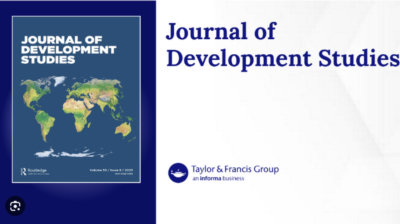Jobs for youth in fragile transitions: Ethiopia’s Youth Revolving Fund
A history of buying political loyalty
A revolving fund – not revolving
How to prevent job creation schemes from becoming a political tool
How to cite this publication:
Asnake Kefale, Lovise Aalen, Mohammed Dejen (2023). Jobs for youth in fragile transitions: Ethiopia’s Youth Revolving Fund. Bergen: Chr. Michelsen Institute (CMI Brief 2023:3)
Ethiopia’s high-level of population growth is contributing to an acute problem of youth unemployment. A lack of jobs and dissatisfaction about future opportunities were partly the reasons for the game-changing youth protests in the country. In an attempt to dampen the protests, the Government of Ethiopia introduced a new job creation scheme – the Youth Revolving Fund (YRF) in 2017, which largely has failed in creating sustainable employment opportunities and improving the lives of the youth.
Key messages
- The political objective of pacifying the youth was a major motivation for pushing the YRF through, despite the fund being officially established to provide funds for job creation for unemployed youth. Funds during the initial years were distributed without the fulfilment of procedural requirements.
- The political expediency of the YRF led to a situation where youth beneficiaries understood the support to be handouts in return for loyalty, reducing their willingness to commit to job creation and repayment of the debt and hence the goal of rotating the fund was by and large not achieved.
- The YRF lacks institutional and organisational mechanisms for supporting the beneficiaries and for monitoring and evaluating the results. The fund is therefore susceptible to corruption and mismanagement.
- A key to sustainable job creation and genuine empowerment of youth is to de-politicise job creation schemes.
Summary
Ethiopia’s high-level of population growth is contributing to an acute problem of youth unemployment. A lack of jobs and dissatisfaction about future opportunities were partly the reasons for the game-changing youth protests that engulfed the country from 2015 to 2018. In an attempt to dampen the protests, the Government of Ethiopia (GoE) introduced a new job creation scheme – the Youth Revolving Fund (YRF) in 2017. In this study, we examine the policy and programme responses of the GoE through the YRF and the major challenges that this initiative face. Primary and secondary data were collected from different sources and we found that the YRF by and large failed in creating sustainable employment opportunities and improving the lives of the youth. This policy brief identifies ways in which job creation schemes for youth can avoid being turned into tools for regime co-optation and control in fragile political contexts.
A history of buying political loyalty
Ethiopia has a long history of using economic benefits distribution for political gain. The imperial regime (1931–1974) and military government of the Derg (1974–1991) largely used the access to land, one of the most important resources in Ethiopian society, as a means to buy loyalty. After the formal introduction of a multi-party system in 1991, membership to the ruling party – the former Ethiopian Peoples’ Revolutionary Democratic Front (EPRDF) which stayed in power from 1991 to 2019 and presently the Prosperity Party (PP) – was not necessarily based on ideological and political conviction of supporters and members. Rather, it became an instrument to exchange political loyalty with economic and other advantages. A substantial number of people, especially the youth, joined the former EPRDF as a means for obtaining job opportunities. The practice of using employment for political support was earnestly begun by the EPRDF after the controversial election of 2005, where for the first time it was challenged for votes by the opposition. Right after the elections, it intensified its mobilisation and control of urban youth. One of the chief instruments that the EPRDF used to win the loyalty of the youth was the Small and Micro Enterprises (SME) scheme. The SME scheme was massively expanded after the controversial election and tens of thousands of young people were given training, loans and market access.
Concomitantly with the expansion of the SME scheme, the EPRDF increased its members from 760 thousand in 2005 to over 4 million in 2008. In the local elections of 2008 and the national elections in 2010, the ruling party regained control of the parliament, with more than 90 per cent of the seats. In the last elections under EPRDF in 2015, the party gained no less than 100 percent of the legislative seats. This complete control of the legislature, however, did not prevent political dissent and protest. Youth dominated protests against the regime started in 2015 and culminated in 2017 with the alliance between protest movements in the two largest regions of the country, Amhara and Oromia. The EPRDF, through internal evaluation, initiated a reform and renewal process in an attempt to endure its national political power. A part of this reform was to re-introduce policies targeting youth as a way to curb dissent. Before these reforms were completed, however, a new alliance between Amhara and Oromo leaders within the EPRDF brought an end to the Tigray dominance in the party, introducing the first Oromo as party chairman and prime minister.
The introduction of the YRF was a direct response to youth protests and the last in EPRDF’s many youth-targeted schemes. It was launched in 2017 at the peak of a period of anti-government protests. The fund is still operational after Abiy Ahmed’s ascent to the premiership in March 2018 and replacement of the EPRDF by PP in December 2019. Abiy Ahmed’s new government promised democratic reforms and said it would address the grievances of the youth. A major question for the research behind this brief was therefore: would the PP government allow the YRF to provide avenues for genuine youth empowerment and sustainable job creation, or would it continue in the EPRDF’s path of using such funds for co-optation and control?
As half of Ethiopia’s youth labour force are without jobs, there is an undeniable need for youth targeted employment schemes.
An undeniable need for jobs
Ethiopia is a country of young people. Over 70% of its population belong to the age cohort below 30 years of age. With this, youth unemployment is one of the highest at about 50% of the youth labour force. There is therefore a strong rationale for introducing policies that improve job opportunities for youth. The allocation of 10 billion Ethiopian Birr (about 343 million USD) for the YRF in 2017 is thus justifiable. Together with the establishment of a Job Creation Commission in 2018 and a new Ministry of Labour and Skills in 2021, the introduction of the YRF expresses the acknowledgement of the GoE about the enduring structural, institutional, financial and technical challenges of addressing youth unemployment. In this respect, the YRF officially aims at providing financial and technical support to the youth in order to help them alleviate their economic and social problems.
Through interviews with experts and officials at relevant ministries, agencies and commissions, ruling party officials, opposition party leaders and youth representatives, youth associations’ leaders and members, and youth beneficiaries in Addis Ababa in the period 2020-2022, complemented with analyses of government policy and strategy documents, it is clear that this aim has not been achieved.
A revolving fund – not revolving
In contrast to other government-run employment schemes including the SME, the YRF adopted relatively easy requirements for borrowers. Unlike other loan schemes, loans under YRF were given without collateral with the guarantee of the borrowers. Moreover, YRF offers a generous grace period (one year compared to the more common 6 months), low matching deposit/savings required (10% as compared to the regular 20%), and duration of repayment of the loan (5 years compared to 3 years for loans from regular financial sources). As a result, the amount of money distributed for the youth was high, in itself an important first step in reaching young Ethiopian job seekers.
Despite these flexible conditions, almost all our informants in Addis Ababa indicated that while all the funds were disbursed, there was minimal, if none, return rate from beneficiaries. Because of this, it was not possible to revolve the fund and expand the number of beneficiaries. The lack of follow up and no serious effort in the part of the funders to oblige the beneficiaries to return the loan suggest that also the PP government, like the EPRDF, has been more interested in using the funds for political gain rather than actual job creation.
Our interviews show that even government officials regarded the funds as a gift for the youth without establishing systems of accountability on the part of the beneficiary to return back the money after the end of the grace period and making profits. As a result, beneficiaries did not feel obliged to repay the loan they received considering it as their “citizenship share” from the government. There was a prevailing perception among the youth interviewed that the YRF is intended to help actual and potential supporters of the incumbent party rather than other groups of society. This is partly related to lack of clear information on the purpose of the loan and the unofficial use of the funds to expand the support base of the ruling party.
How to prevent job creation schemes from becoming a political tool
Empirical evidence from many parts of Africa indicate that authoritarian regimes maintain their political dominance through repression and economic co-optation or patronage politics. Funds for job creation are parts of this patronage politics, as seen in for instance Zimbabwe and Uganda where employment schemes have been (mis)used by rulers to recruit party members and strengthen their political dominance. Put simply, party members and the would-be members/supporters are favoured in accessing employment schemes and loans often at the expense of potential and actual opponents.
Our study has revealed that Ethiopia follows the same pattern. Throughout Ethiopian history, rulers have used economic resources for buying loyalties and as survival strategies through patrimonial politics. Similarly, the YRF was intended to quell youth opposition to the regime. As our findings confirm, loans under the scheme were distributed without having clear criteria of selection and a credible system of recovering the loans and hence the loans were even regarded by the beneficiaries as gifts. The 2018 political reform following public protest in the country was hoped to bring about changes by introducing reforms that enhance the democratic legitimacy of the government and improve its working procedures. But what happened on the ground reveals more of a continuity than change. Hence, the major task for any responsible body for the successful implementation of employment schemes like YRF is to depoliticize them by focusing on tackling the economic problems of the youth and enhancing the management of the schemes.
The Youth Revolving Fund represents a continuity in the Ethiopian history of using government funds for political ends
Policy recommendations
For international donors:
- Conduct context-specific political economy analyses before implementing donor-funded employment schemes in order to uncover potential patronage and clientelism.
- Introduce ways which promote the de-politicization of donor funded youth employment schemes.
- Introduce mechanism that would enable young people – representing a variety of voices – participate in the design and implementation donor supported youth employment schemes.
For national governments:
- Include transparent and inclusive selection or recruitment processes in employment schemes that focus on economic needs and potential – not political connections and loyalties.
- Set the political, economic and social objectives and targeted goals at the outset, enabling the stakeholders to evaluate achievement against stated objectives.
- Establish an independent institution to administer the fund to enhance effective implementation and minimise the risk of corruption, whilst improving the selection of beneficiaries, use of the funds, data management, monitoring and evaluation.
Further readings
Di Nunzio, M. (2015) “What is the Alternative? Youth, Entrepreneurship and the Developmental State in Urban Ethiopia”. Development and Change, 46(5). 1179-1200. DOI:10.1111/dech.12187.
Eyob Balcha Gebremariam (2017) “The Politics of Youth Employment and Policy Processes in Ethiopia”, in Africa’s Youth Employment Challenge: New Perspectives, IDS Bulletin, Vol. 48, No. 3.
Jobs Creation Commission (2020) Plan of Action for Job Creation (2020-2025). Briefing Document. Federal Democratic Republic of Ethiopia.
Asnake Kefale; Mohammed Dejen, L. Aalen. (2021) “Neglect, Control and Co-optation: Major features of Ethiopian Youth Policy Since 1991” CMI Working Paper WP 2021:3.
Lyons, Terrence, and Leonardo Arriola. (2016) “Ethiopia: The 100% Election”. Journal of Democracy, vol. 27, no. pp. 76-88.
Proclamation (No. 995/2017). A Proclamation to Provide the Establishment of the Ethiopian Youth Revolving Fund. Federal Democratic Republic of Ethiopia.
A key to the sustainability of youth employment schemes is the de-politisation of such schemes.
This brief is an output of the project Youth in Africa, on youth representation and job creation in four African countries, funded by the Norglobal programme of the Research Council of Norway. This is a collaborative project including partners from CMI, Institute of Development Studies (UK), Forum for Social Studies (Ethiopia), Institute for Social and Economic Studies (Mozambique), Great Zimbabwe University / Sol Plaatje University (South Africa), Uganda Management Institute, and University of Bergen (Norway).








